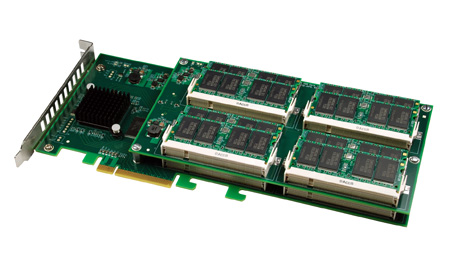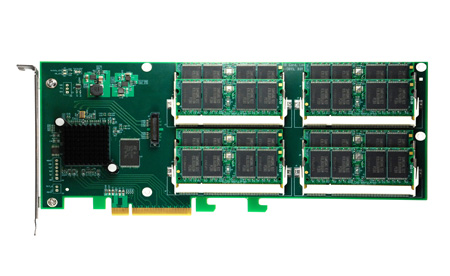OCZ Z-Drive R2: 1.4GB/s


You may have noticed that I’ve posted quite a bit on the subject of SSD drives over the past couple years. The speed this technology can afford has the potential to finally set us free as artists so that we can focus on our work and not beach balls and hourglasses. The main bottleneck of modern computers is the hard disk drive, which has inexplicably been frozen in time at speeds which have remained constant almost as long as I can remember. Remove this bottleneck and a whole new world opens up.
The problem with SSD so far is it’s failure to truly deliver on it’s promises of speed. Sure, 250MB/s is fast, but only marginally quicker than a standard HDD. So I was excited to see the announcement from OCZ that a new version of their Z-Drive, the “R2” is due out soon.
The original Z-Drive was somewhat of a disappointment but — at least from the specs on this one — they seem to have learned some lessons from that initial attempt. The new model sports an 8 way RAID 0 setup (basically like 8 SSD drives in RAID 0 on a hardware controller — beats the heck out of my setup) — and speeds around 1.4GB/s. In case you didn’t read that correctly: 1.4GB/s. Insane speeds. And that’s both ways, read and write.
Imagine having this thing set up as your Photoshop swap drive (or, as the Engadget article suggests, editing raw 1080p footage in real time). In PS, I’d imagine you could tear through 24×36″ @ 300dpi with hardly a delay. And at 2TB (the largest possibly configuration), the Z-Drive is truly massive for an SSD. You could fit your entire OS and your data on there for quick file open/saves. And with 1.4GB/s of overhead, I wouldn’t think twice about using the drive as my OS and swap at the same time.
Now for the price (which hasn’t been announced yet): expect ridiculous. The original model ranged from $1500-$2700 and I don’t see this one coming too far down from that. But for performance like this, you have to pay. And when you consider the potential cost of eight SSD drives totaling 2TB and a hardware RAID controller the Z-Drive starts to sound a bit more affordable.
OCZ Product page
Further reading at Engadget & Hot Hardware

17 Comments Leave A Comment
Matt Sauter says:
April 9, 2010 at 12:28 pmDaaaaaannnngg. That’s insane! I’d cut off a stranger’s arm for this.
…I’m going to need both of mine for making use of it.
David says:
April 9, 2010 at 1:58 pmAlthough it has impressive power, I am still wondering what the exact life expectancy on this hardware is. Currently there are still no great manufacturer guarantees on SSDs that I am aware of.
But it must be long enough to fork out $1500. In any case its still an absolutely stunning (relatively new) technology.
Trevor cook says:
April 9, 2010 at 2:06 pm$8,800+ for 2tb and $3,700 for 1tb. Pretty incredible numbers, but $4/gb for solid state isn’t too terrible…
source
Scott says:
April 9, 2010 at 2:29 pmdavid-
I have been running a total of 5 SSDs (4 in my main tower and one in my MBP). All are the OCZ Vertex. It’s been about a year now and I haven’t seen any problems yet. It remains to be seen how they do in the long run, but from the usage studies I’ve seen they should outlast all of my HDDs. All of the hype you hear about SSD longevity issues pertains to enterprise stuff, servers doing constant read/writes for years at a time. If you’re just using the drive for a swap disk you won’t be seeing the limits any time soon (if ever). If you’re running one as your OS, you might start to approach the kinds of write endurance limits people have been talking about, but that would only be after years of continued use, many years. Besides, it’s not like HDDs were lasting that long anyways.
If it’s the performance over time issue you’re concerned about, most of the modern SSDs have a controller with some sort of garbage clean up routine built in on the hardware level (sort of like TRIM in software) that will ensure the performance stays constant throughout the life of the drive.
thehalvo says:
April 9, 2010 at 4:49 pmScott –
I use the OCZ Vertex in my MBP as well. Do you ever have issues with the OS freezing at random? Everything locks up about once a month, and this never happened with my old HD from apple. Thoughts?
Scott says:
April 9, 2010 at 5:21 pmthehalvo-
never had that problem, that machine is by far the most stable out of everything here. I never upgraded to Snow Leopard though, not sure if that’s a factor? SL seems sort of heavy on resources, I have it running on a Mac Mini and it’s a little overwhelming I think.
Western Infidels says:
April 10, 2010 at 2:17 pm“The problem with SSD so far is it’s failure to truly deliver on it’s promises of speed. Sure, 250MB/s is fast, but only marginally quicker than a standard HDD.”
Actually, for disks, the important performance figure is usually the seek latency (measured in ms), not the continuous maximum transfer rate (measured in MB/s). And current generation SSDs (even those with slower maximum transfer rates) make a system feel fast because their seek latencies are around 1/20th that of mechanical disks, which is a very big performance jump indeed.
Scott says:
April 10, 2010 at 8:11 pmwestern infidels-
seek is only a big factor when reading/writing many files. I use the SSDs for my swap drive in Photoshop, which is just one (sometimes 2 or 3 if things get really large) big file. so for my purposes (or that of video editors) I think sustained speeds are important.
But I will say that when I started using an SSD as the OS drive on my MBP it started booting in like 10 seconds and apps just spring open. so yeah, that’s a big plus too.
thehalvo says:
April 11, 2010 at 8:15 pmScott –
Mkay. It’s probably Snow Leopard then. That wouldn’t surprise me. My old MBP died and apple replaced it with a new MBP and SL was preloaded. Thanks.
simoncpage says:
April 13, 2010 at 8:52 amThe main thing that had put me off was the price to get just 250MB/s which doesn’t really get me excited:
MacBook – +£1,040 for 512GB (250MB/s)
Alienware ALX – +£850 for 2 x 256GB (2 x 250MB/s / RAID 0)
Intel X25-E Extreme – £600 for 64GB (250MB/s)
1.4GB/s is much more like it and utilising the PCI slot is nice – will be looking forward to getting whole of this.
Interested in why you think the price point for these have taken so long to come down? slow pick-up by the market?
Scott says:
April 15, 2010 at 5:00 pmsimon-
yeah, this sort of leap is what was needed for sure.
not really sure why it’s taken so long, but I guess when you think back to when hard drives were breaking the 1GB barrier, that wasn’t all that quick, or cheap either. Also, I think flash memory is a lot more expensive to produce that traditional platter-based HDD tech. The thing that amazes me is how long we’ve had to languish in the 100MB/s zone. It seems like HDDs took about 5 years to get from 60MB/s to 100MB/s and then they just froze, no movement for another 5 years. It;s great to see this ridiculous bottleneck finally being opened up.
Brandon S. Adkins says:
April 20, 2010 at 11:50 pmI have to disagree with your statement that SSDs have failed and are only marginally faster than regular HDDs.
3x faster is not marginal. Most HDDs in recent years have gotten around 80MB/sec or less. HDDs are just now solidly breaking the 100MB/sec barrier. SSD’s are getting 200-300MB/sec+
Additionally, the seek time on SSDs averages 0.1ms vs 8-15ms on HDDs. Although 15ms sounds fast, something 100x faster is certainly noticeable. People with SSDs have been raving about how quickly their systems boot, how fast Photoshop and other heavy apps launch, and how snappy their systems feel.
SSDs are far from a failure. Tripling current HDD speeds and virtually getting rid of seek times is a great success in technology, and I can’t wait to see more of it.
Noel says:
August 4, 2010 at 10:40 amWay overpriced. Multi-threaded apps kill it. With 16 threads, you will see a max of ~800MB/s read and maybe 200MB/s write. It is a prosumer product at best, NOT an enterprise-class product as they are marketing it. We have had one for 2 weeks and hammered the stew out of it, and now one whole “bank” is dead. It has 8 “drives” in RAID0 on the card. One died two days ago, taking the data that was on it along with it. Luckily, it was non-critical data, but still scary nonetheless. This one is going back, and I will be replacing it with a true enterprise-ready SSD from Fusion IO, of course at a higher cost.
michael says:
August 28, 2010 at 1:18 amI’ve got one of the smaller versions ( 256GB and about 800 MB/s ).
IT freakin rocks. Yes, they are very expensive, but man, worth every penny. I’d love to get the 2TB one, though. They’re bootable, and you can really see a dramatic improvement when you use an even lighter O/S like some linux flavors. I’ve even used it on CentOS and it also rocks. No problems. Some O/S have difficulty loading on a drive that is already raided – whereas some O/S WANT to do the raid for you in a software version. Koodos to OCZ for coming up with something MUCH less expensive than ALL other competitors. I suspect they are using a PCIe-to-PCI-x conversion behind the scenes, and then raiding the controller chips ( indilinx and/or Sanforce ). Both of which are fantastic. But yea, you’ve got to realize each chip is like a separate ssd. So that explains the cost – and the speed. Other competitors have similar things for like 30,000 and up. OCZ at least makes it more affordable than others.
michael says:
August 28, 2010 at 1:21 amAlso,… as much as I would love to get Fusion-IO, years later they are still not bootable. And the other key things to note is that everyone talks about the MB/s or GB/s – but they forget the more critical measurements of IOPS. These drives from OCZ very from 40,000 to 80,000 depending on the model. ( with faster ones coming out soon, too ). And they are not measured in milliseconds, they are measured in micro-seconds for access-time.
michael says:
August 28, 2010 at 1:27 amBtw – I should also point out, these are technically called SSS ( solid state storage ) not ssd. But here’s the thing.
What used to take me 8-12 hours now takes about 19 minutes. Even with multithreaded I/O (all cores running) on a linux box. Copies of HUGE amounts of data was insanely fast. I think this will be the wave of the future – at least, or until, they produce the atomic switch hard drive based on measuring atoms. Then we’ll shift into the realm of hundreds of petabytes in a 2D and 3D measurement ( instead of just flat 0’s and 1’s ). I’ve been waiting for those for many years now. They basically push around some iron particles in an electromagnetic field and measure the stuff with a laser that is focused in the ultraviolet field. ( we’ve seen the shift from red lasers to blue lasers for a smaller NM measurement, i.e., “blue-ray” technology. We’ll see what happens. I suspect at that time, they will be able to store everything on file at that point. Even everything about a person from head to toe, from the cradle to the grave. Scary.